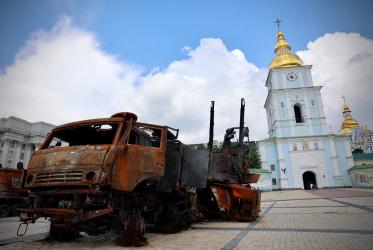The 2020 Week of Prayer for Christian Unity marked my life in a special way. As a student of the Ecumenical Institute of Bossey, I had the opportunity to celebrate the prayer week in Rome as part of the study program prepared by the Roman Catholic Church and the World Council of Churches. The diversity of ecclesial traditions, cultures, and social contexts were present to me through known faces of those who were gathered there praying, singing, reading the Bible in different languages, and reflecting together around the Word of God with a sense of unity and communion.
The COVID-19 pandemic has given a particular sign to the dynamics of life, of being the church, of being a world community of Christians, and it also gave a different emphasis to the 2021 Week of Prayer for Christian Unity. We continued to be a praying church locally beyond the physical space of the temple and an ecumenical family connected in God’s love in lockdown circumstances. The theme proposed by the Community of Grandchamp in Switzerland made us reflect on the praxis and the constant challenge of abiding in the love of God in times of a global health crisis, isolation, economic deprivation and socio-political changes. It is then possible, and only in the love of God, to recognize and bear the fruits of the Spirit that remain fresh and abundant also, and especially, in the midst of difficulties:
The fruit of gratitude makes us value those experiences that still beat: words, looks, activities, people, environments ... recover them, reflect on the learnings and present them as an offering of thanksgiving to God. We are thus encouraged to enter into peace with everything we have experienced, recognizing the presence of God in our lives and in the lives of our neighbors.
The fruit of humility allows us to understand our fragility before the mystery and grace of God and offers the opportunity to recognize ourselves as human beings in a relationship of dependence with each other and with all creation. The abuse of power, and the need for superiority and dominance, remain in the background when life itself is at risk.
The fruit of resilience helps us overcome and transform difficulties trusting in God. Creativity in the use of the virtual platforms has been essential but just an example of the alternatives to build community in the midst of isolation.
The fruit of solidarity seems to be antagonistic in a context in which staying in lockdown, self-care and survival are norms. However, although the pandemic has affected us all, we recognize that there are more vulnerable and disadvantaged people. So the lockdown has also been an opportunity to care and advocate for those who face the worst consequences of the social gaps that already existed before and that have increased with the current social, economic and epidemiological situation.
Last and equally important, is the fruit of hope. Turning the lament into hope has been the mission of the church and the ecumenical movement, convinced that if with God we reap the fruits, we are not afraid to reap the uncertainties, the difficulties; to overcome them, to learn from experiences so that they do not sour the new sowing.
Our testimonies, reflections, and prayers continue to encourage the journey of faith of the church in the world. If it has been like this in 2021 with the COVID-19 pandemic, it will be so also next year regardless of the conditions we face as humanity, because we know there might be unexpected changes, but in God's eternal love we abide.








